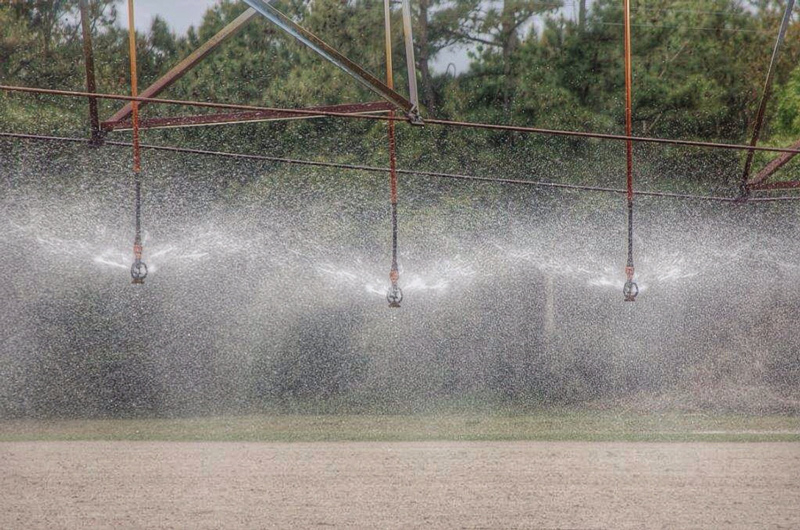


Getting beyond the ick
Photo by Michele Walfred November 17, 2021
UD researchers investigate how to improve consumers’ response to recycled water
University of Delaware researchers are investigating consumers’ willingness to purchase food products grown with recycled water.
One of the most precious resources on Earth, water is getting more scarce. Americans living in places like the Colorado River Basin see the issue on their doorstep. The issue is widespread; 40 out of 50 states can expect water shortages by 2024.
With a demand to feed a global population swelling above eight billion people, agriculture is a leading industry in water use, reaching as high as 80% of total usage in some regions.
“Fortunately, this is a problem that can be solved,” said Kent Messer, S. Hallock du Pont Professor at the University of Delaware. “Recycling wastewater for agricultural purposes is a cost-effective, sustainable and safe solution.”
Countries like Israel successfully invested in wastewater treatment facilities decades ago. But wastewater recycling technology can only serve its purpose if consumers are willing to put the products grown with treated wastewater in their grocery cart. Many shoppers can’t get past the “ick” response or stigma — an irrational or exaggerated response to the risk. So, getting to the bottom of consumer attitudes is a major key to the technology’s application.
“Psychologically, the further away you can keep a product from where the contact occurred with a potential contaminant, the more comfortable the consumer feels,” Messer said. “People dislike the words recycled water or reclaimed water. They don’t like things that focus on where the water came from; they like to know what the current status of the product is now — pure, fresh or natural.”
In the case of recycled wastewater, such a reaction feels natural. Research validates this very primal response as hardwired into human beings.
“Most people’s brains respond negatively to the ‘toilet to tap’ concept,” Messer said. “However, we use manure in fertilizer to grow food. We can use water that’s been in contact with wastewater to successfully grow food, feed the world and solve the water crisis.”
In a research paper published in the American Journal of Agricultural Economics, UD, University of Pennsylvania and University of Florida investigators went up and down the grocery aisle. From bottled water to spinach to dairy products, they asked where consumers drew the line. Shoppers made purchasing decisions on real products with real money. Some items were produced with traditional ground water and others with treated, recycled water.
Consumers were uncomfortable purchasing products like bottled water and fresh fruit, which were perceived to be more directly connected to recycled water. But animal byproducts like cheese produced by cows who drink recycled water drew much more favorable responses.
Findings also suggest that consumers’ stigma to products grown with recycled water is essentially removed when this water also passes through a natural barrier, such being injected into an aquifer before being pumped out for irrigation use.
“Consuming food grown with treated, recycled wastewater is safe, but many people feel bad when doing it. So, they often shun it,” said Messer. “So, the challenge becomes that we need to clean the water physically, but also psychologically. That’s where this natural barrier finding comes in.”
The study’s results provide actionable information for policymakers, water managers, and the agricultural and food industries.
“Just having a solution that works technically is not sufficient to solve the water crisis,” Messer said. “The findings give [these groups] strong evidence about finding the right water for the right uses, where consumers feel okay with it. Maybe we keep recycled water away from fresh spinach. Or, if you’re going to use it to irrigate peaches, make sure that water has gone through an aquifer.”
About the researchers
Sean Ellis is a former postdoctoral researcher at the University of Delaware and current research project manager at the Behavior Change for Good Initiative at the University of Pennsylvania. Olesya Savchenko is an assistant professor for agricultural economics and policy at the University of Florida. Kent Messer is a S. Hallock du Pont Professor and director of the UD Center for Experimental and Applied Economics.
About the funding
Funding for the study came from a U.S. Department of Agriculture National Institute for Food and Agriculture CONSERVE Grant (Center of Excellence at the Nexus of Sustainable Water Reuse, Food, and Health).
Contact Us
Have a UDaily story idea?
Contact us at ocm@udel.edu
Members of the press
Contact us at 302-831-NEWS or visit the Media Relations website

